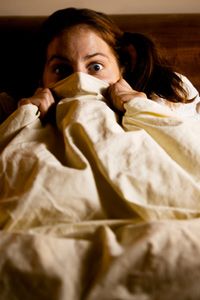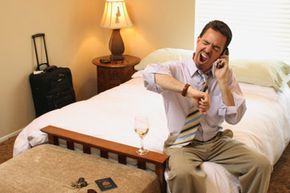Bad things happen in the dark. Just ask any child, who knows that monsters appear in the closet and under the bed after lights out. The phrase "a dark and stormy night" is a prerequisite for a good scary story, because night is when ghosts, serial killers and supernatural creatures all make their most haunting appearances. With all these bad things happening at night, how can we fall asleep? Why don't we stay awake and defend ourselves?
It's possible that humans sleep at night because our ancestors needed to be hidden away, snug as a bug in a rug, when nocturnal predators were on the prowl. But even though scientists aren't quite sure of the reason why we sleep at night, they do know that melatonin has something to do with why we get sleepy as the sky goes dark.
Advertisement
Melatonin is a hormone produced by the pineal gland in the brain, which receives its marching orders from the hypothalamus. The human eye, which is connected to the brain via nerve endings, sends messages to the brain when the sky gets darker, helping the hypothalamus keep track of the day's progression. When dusk falls, the hypothalamus alerts the pineal gland to start producing melatonin. Melatonin production continues throughout the night, spiking in the wee small hours and tapering off once it's morning. Though scientists aren't exactly sure how the hormone helps us sleep, it's clear that melatonin is integral to keeping us on a 24-hour-a-day schedule of snoozing when it's dark and waking when it's light.
Blind people don't get these cues, as they can't tell when it's light and when it's dark. As a result, many blind people lack a sleep pattern based on a 24-hour day; instead, their body adopts free-running circadian rhythms that approximate a 25-hour day [source: Goode]. This means that a blind person could be up all night, and then feel an intense need to sleep at a point that moves an hour forward or back every day. In a 1999 study, researchers found that they could use melatonin supplements to regulate a blind person' s circadian clock, so that they fell asleep and woke up at the same time as the general population [source: Goode].
So if we know that melatonin is one of the reasons why we sleep when night falls, and we know that it standardizes the sleeping schedules of a blind person, then could melatonin supplements help those of us with occasional sleeping problems or even more serious sleeping disorders?
Advertisement


